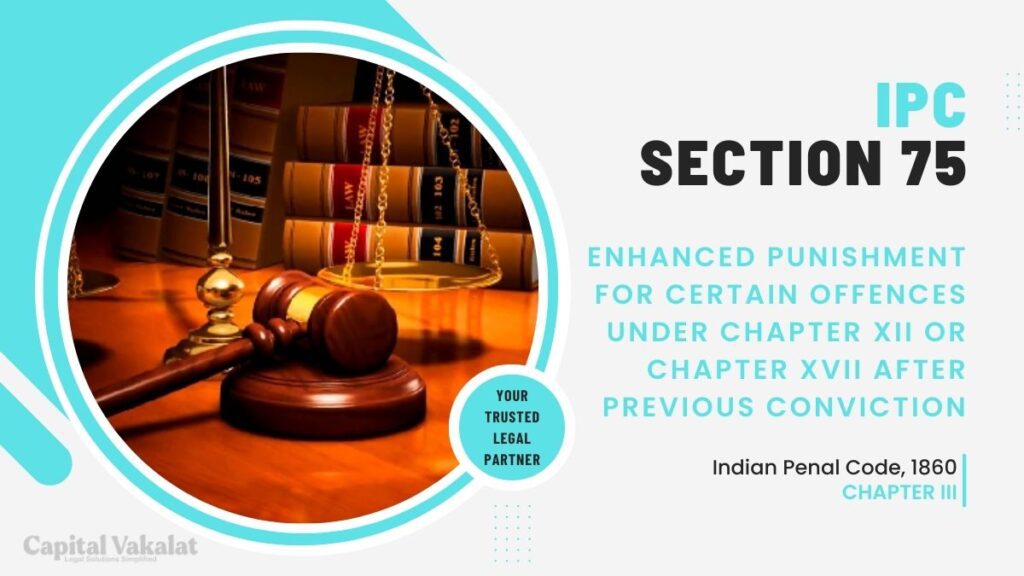In the realm of criminal law, the Indian Penal Code (IPC) stands as the backbone of justice, outlining various offenses and their corresponding penalties. Within this extensive legal framework, Section 75 of the IPC holds a special place. This provision deals with enhanced punishment for certain offenses under Chapter XII or Chapter XVII of the IPC when an individual has a prior conviction.

In this article, we will delve into the intricacies of Section 75 IPC, exploring its significance, implications, and the broader legal landscape.
Exploring the Basics
What is Section 75 IPC?
Section 75 of the Indian Penal Code is a legal provision that prescribes enhanced punishment for individuals who commit specific offenses under Chapter XII (Offenses Relating to Coins and Government Stamps) or Chapter XVII (Offenses Against Property) of the IPC, provided they have a previous conviction.
Understanding the Rationale
The Intent Behind Section 75 IPC
The primary objective of Section 75 IPC is to deter repeat offenders by imposing stricter penalties. It aims to discourage individuals who have already been convicted of certain crimes from engaging in similar unlawful activities in the future. By doing so, the legal system seeks to protect society and maintain law and order.
Offenses Covered
Which Offenses Fall Under Section 75?
Section 75 IPC applies to offenses falling under Chapter XII and Chapter XVII of the IPC. These offenses include but are not limited to:
Chapter XII Offenses:
- Counterfeiting coins or government stamps.
- Possession of counterfeit currency or forged government documents.
Chapter XVII Offenses:
- Theft.
- Robbery.
- Dacoity.
- Extortion.
- Mischief causing damage to property.
Enhanced Punishment
What Does Enhanced Punishment Entail?
Under Section 75 IPC, individuals convicted of offenses mentioned earlier will face an increased punishment if they commit a subsequent offense. The enhanced penalty serves as a powerful deterrent and varies based on the nature and severity of the crime. It can include longer prison sentences, higher fines, or a combination of both.
Legal Implications
The Significance of Previous Conviction
To trigger Section 75 IPC, it is essential that the individual has a prior conviction. This requirement ensures that the enhanced punishment is applied to individuals who have a history of criminal activity. It also underscores the importance of rehabilitation and societal reintegration for ex-convicts.
Case Precedents
Landmark Cases
Over the years, Section 75 IPC has been invoked in several landmark cases to deliver justice and maintain law and order. One notable case involved the enhanced sentencing of a repeat offender who had committed theft multiple times.
Conclusion
In conclusion, Section 75 IPC plays a crucial role in the Indian legal system by deterring repeat offenders through enhanced punishment for specific offenses. By imposing stricter penalties on individuals with prior convictions, it seeks to maintain law and order while promoting rehabilitation and societal reintegration. This provision serves as a powerful tool in the pursuit of justice and safety for all citizens.
FAQs
What are the key objectives of Section 75 IPC?
The primary objectives are deterrence, protection of society, and maintaining law and order.
What are some offenses covered under Chapter XII of the IPC?
Offenses in Chapter XII include counterfeiting coins or government stamps and possession of counterfeit currency or forged government documents.
How does Section 75 IPC contribute to justice?
It contributes by imposing enhanced punishment on repeat offenders, discouraging them from engaging in similar unlawful activities.
What should individuals with a previous conviction focus on?
Rehabilitation and societal reintegration are crucial for individuals with prior convictions to avoid facing enhanced penalties under Section 75 IPC.